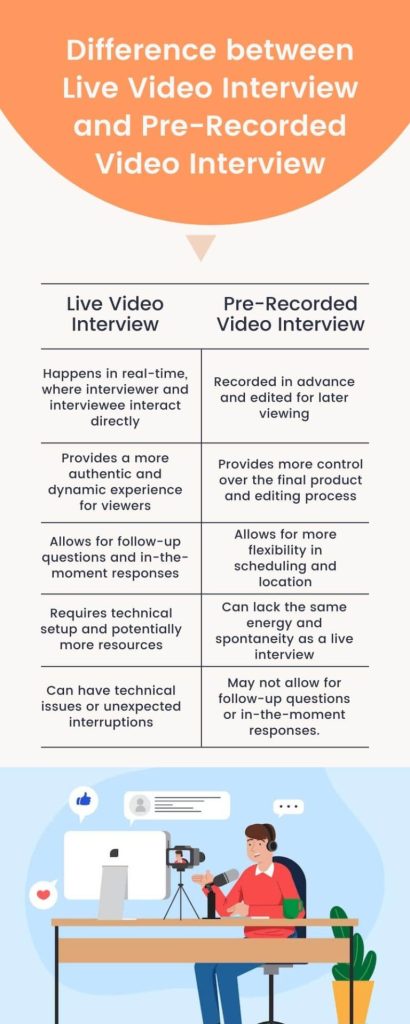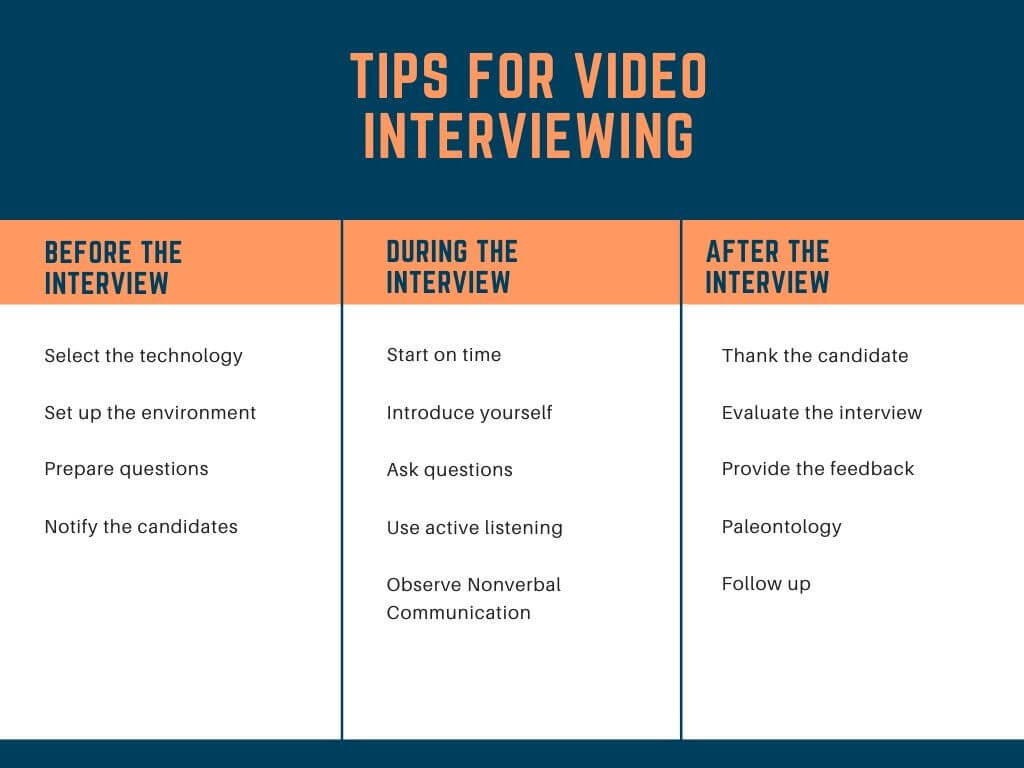In the age of the coronavirus, the setting and rules of interviewing have changed. The widespread adoption of video conferencing platforms has made conducting video interviews more viable and convenient than ever before. If done effectively, it can speed up the hiring process and help in the proper evaluation of candidates.
Of course, video interviewing is not a new concept. However, some recruiters and hiring managers may not be as familiar with video conferencing technology and conducting interviews remotely.
Worry not. In this blog, we will walk you through the types and advantages of video interviewing. We will also provide helpful tips for employers to follow while conducting video interviews.
What is Video Interviewing?
Video interviewing is a type of job interview conducted remotely using video technology, such as Skype, Zoom, or other video conferencing tools.
Video interviews allow employers to connect with candidates who may be located in different geographic areas. It also helps save time and costs associated with traditional in-person interviews. It also helps reduce scheduling conflicts and can streamline the end-to-end recruitment process.
This technique is particularly useful for companies that hire remote workers or for roles that require a lot of travel.
What are the Different Types of Video Interviewing?
Video interviewing has become increasingly popular in recent years due to advancements in technology and the rise of remote work. It has become a valuable tool for employers to assess candidates’ skills, experience, and cultural fit.
Employers can conduct video interviews in two ways: live video interviews and pre-recorded video interviews.
- Live Video Interviews: Live video interviews are conducted in real-time using video conferencing software such as Zoom or Skype. The interviewer and candidate communicate with each other through the video conferencing platform. Live video interviews are like traditional in-person interviews, but they take place remotely. This help in eliminating the need for the candidate to travel to the interview location.
- Pre-recorded Video Interviews: These involve candidates recording their responses to a set of pre-determined questions using a platform designed for this purpose. Candidates are typically given a set amount of time to respond to each question and they can re-record their responses until they are satisfied with the result. Employers can review the pre-recorded interviews at their convenience and can share them with other members for feedback.

Advantages of Video Interviewing
Video interviewing has numerous benefits for organizations, some of which include:
- Saves Cost and Time: Video interviewing eliminates the need for travel and can save organizations both time and money. The hiring process becomes faster and more efficient, as interviews can be scheduled at the convenience of both the interviewer and interviewee.
- Improves Access to Talent: Video interviewing enables organizations to reach out to a wider pool of candidates. They can interview candidates from different geographic locations without needing to have them physically present.
- Enhances Candidate Experience: These types of interviews can be conducted from the comfort of one’s own home. So, they provide candidates with a more flexible and comfortable interviewing experience. This can also help reduce the stress and anxiety associated with in-person interviews.
- Improves Assessment of Candidates: Video interviewing can provide organizations with valuable insights into candidates’ communication skills, body language, and presentation skills. On the other hand, it can also be recorded, allowing hiring managers to review the interview and evaluate candidates more thoroughly.
- Facilitates Collaboration: It allows multiple interviewers to participate in the interview process, regardless of their location. This helps to promote collaboration and better decision-making during the hiring process.
Best Practices for Video Interviewing
As technology continues to evolve, more and more organizations are turning to video interviewing techniques to streamline their hiring processes. Conducting a video interview can be a bit different from an in-person interview, so it is important to be prepared. In this section, we will explore the steps to conducting a successful video interview.
Before the Interview:
Prior to conducting your video interview with potential candidates, follow the steps below to ensure that the process goes smoothly.
- Choose the Right Technology: It is important to choose the right video conferencing software for the interview that is reliable and easy to use. Make sure that both you and the candidate have access to the technology and have tested it beforehand. It will help to avoid any technical difficulties during the interview.
- Set Up the Environment: Select a quiet, well-lit space with a neutral background that will minimize distractions and make the candidate feel comfortable. Ensure that your internet connection is stable and that your camera and microphone are working properly.
- Prepare Interview Questions: Create a list of interview questi ons that are relevant to the position and that will help you assess the candidate’s skills and experience. Practice the questions to ensure that they flow well and are easy to understand. You can also review the candidate’s resume before the interview to tailor your questions to their experience and qualifications.
- Notify the Candidate: Let the candidate know that the interview will be conducted via video. Also, provide them with any necessary information, such as the date, time, and video conferencing software to be used.
During the Interview:
Try to maintain a professional atmosphere while conducting your video interview with possible prospects. Remember that this is a job interview, so dress professionally and keep the tone professional.
- Start on Time: Begin the interview on time to demonstrate your professionalism and respect for the candidate’s time.
- Introduce Yourself: Start the interview by introducing yourself and explaining the format of the interview. Make the candidate feel comfortable by establishing rapport.
- Ask Questions: Ask behavioral questions that require the candidate to provide specific examples of how they have handled similar situations in the past. It will help you evaluate their skills and determine if they are a good fit for the position.
- Use Active Listening: Use active listening during the interview to show the candidate that you are engaged and interested in what they are saying. This can also help you pick up on subtle cues that provide insight into the candidate’s personality and work style. Be sure to listen carefully to their responses and take notes.
- Observe Nonverbal Communication: Pay attention to the candidate’s nonverbal communication, such as body language and tone of voice. It will help you gain insight into their level of confidence and engagement.
After the Interview:
Once the video interview is finished, try to keep your recording and notes for future reference. Following up with each candidate is also good business etiquette.
- Thank the Candidate: End the interview on a positive note by thanking the candidate for their time and expressing your interest in their candidature. Also, inform them of the next steps in the recruitment process.
- Evaluate the Interview: Review your notes and assess the candidate’s performance to determine if they are a good fit for the position.
- Provide Feedback: If the candidate is not a good fit for the position, provide feedback in a constructive and professional manner. If the candidate is a good fit, move them along in the hiring process.
- Follow Up: Follow up with the candidate in a timely manner to provide updates on their status in the hiring process.

Conclusion
While videoconferencing may appear less natural than in-person meetings and may make demonstrating your company culture more difficult, it does work. It is an effective way to keep candidates engaged and move them through the hiring pipeline, quickly and safely.
By following the steps outlined above, organizations can conduct successful video interviews that enable them to make informed hiring decisions.











